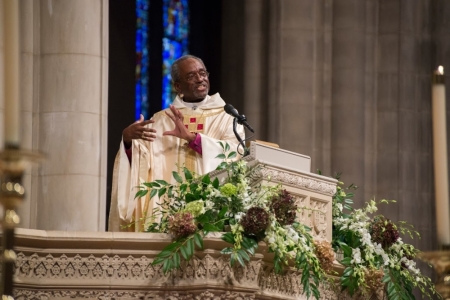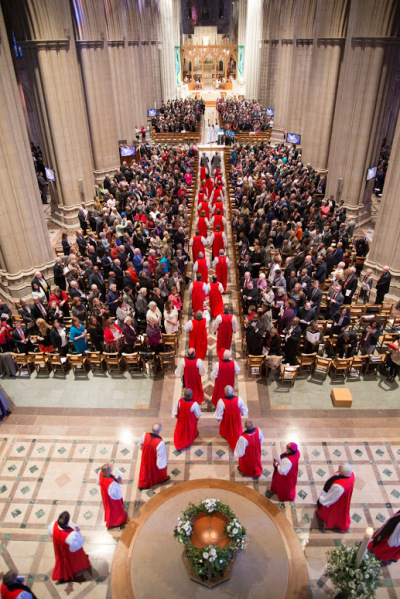Episcopal Church Installs First Black Leader; Says 'God Is Not Finished' With Denomination

The Episcopal Church has officially installed its first African-American leader, in a ceremony that mixed traditional ritual and a focus on diversity.
At the Washington National Cathedral on Sunday, the Right Rev. Michael Curry of North Carolina made history by becoming the first African-American Presiding Bishop of the Mainline denomination.
"Greet your new presiding bishop and his family," said outgoing Episcopal Church head the Rev. Katharine Jefferts Schori, the crowded Cathedral breaking out into loud applause.
During his sermon as the recently crowned presiding bishop, Curry emphasized a call to renewal for the denomination, proclaiming that "God is not finished with The Episcopal Church yet."
"What God has done in the past, God can do again. God Who parted Red Seas can do it all over again. The God Who raised the dead to life can do it all over again," declared Curry.
"Jesus did not come here to found a religion or to start an institution. Jesus came to inaugurate, to begin, to catalyze a movement."

In June at the 78th General Convention in Salt Lake City, Utah, Curry was elected to become the 27th presiding bishop of The Episcopal Church.
One of four candidates for the position, Curry was elected after only one ballot, garnering 121 votes out of a total 174 cast.
Union of Black Episcopalians President Annette Buchanan said in a statement following the vote that she was "overwhelmed" and "excited" at Curry's election.
"I had one colleague say that we never thought in our lifetime that we'd live to see a black president of the United States and a black presiding bishop," stated Buchanan.
"Presiding Bishop-elect Michael Curry is a longtime UBE member. He believes in the Church being inclusive for all, especially African-Americans and Africans of the diaspora, and we are confident that his ministry will expand to all in the church based on the experience that we've had with him to date."
The installation service for Curry was a mixture of traditional ritual aspects and modern emphases on racial, cultural, and religious diversity.
Musical selections for the service included Latin contemporary, Afro-American gospel, and Native American chanting. Biblical readings were spoken primarily in English, but also some were given in Spanish and Native American languages.
During the prayers made over Curry regarding his ministry, two religious leaders that gave prayers represented Judaism and Islam.
The service also included traditional components, such as Curry knocking with his staff on the front door of the Cathedral, liturgical responses, and the usage of incense and clerical processions.
This mixture of traditional and contemporary could be noted with the famous musical piece "Battle Hymn of the Republic." During his sermon, Curry changed a line from the Julia Ward Howe song as "As He died to make folk holy, let us live to set all free."
Later in the service, a choral performance of the hymn used its original line "As He died to make men holy, let us die to make men free."
As leader of The Episcopal Church, Curry has taken the reins of a denomination that has in recent years experienced rapid decline and theological schism.
The denomination's increasing acceptance of homosexuality in particular has been a source of controversy, leading scores of congregations and even a couple dioceses to leave the Church.
As Curry accepted the presiding bishop's staff, two sides in a legal dispute over possessions of the Episcopal Diocese of South Carolina await a decision from the state supreme court over who rightfully owns the diocesan trademark and properties.
Curry did not touch upon the controversies in his sermon, but did stress the need for the Church to become active in the "Jesus Movement," which involves "turning the world upside down, which is actually right-side up."





















